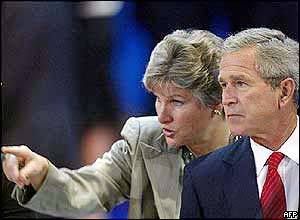Information War Chief Admits (Sort Of) Failure
 Karen Hughes, the long-time Bush communications maven and current undersecretary of state for public diplomacy and public affairs (my dream job!), heads perhaps the least successful front in the war against Islamofascism.
Karen Hughes, the long-time Bush communications maven and current undersecretary of state for public diplomacy and public affairs (my dream job!), heads perhaps the least successful front in the war against Islamofascism.Her job is commanding the information war and her goal is to turn global public opinion in our favor. It is in many ways a more difficult task than achieving military victory. She doesn't have laser-guided missiles at her disposal, and she's fighting on no less than three fronts: Against a very effective Islamist PR machine, against a suspicious and combattive media, and against a Dem PR machine often more concerned with taking down Bush than taking down Islamofascists.
In a WaPo op/ed today, she details in heart-lifting detail the compassion of America, but also admits defeat in the info war:
Eunice Shriver, the mother of California's first lady, was in the audience and raised her hand to ask why we don't hear more about these [U.S. charitable] programs.The keystone for Hughes' speech and op/ed was the recently concluded White House Malaria Summit. It's typical of the good work we're doing, focusing our resources on a huge problem (she said malaria kills 3,000 children a day) -- and it's typical of the tough slog of promoting good news.
A short answer is that bad news tends to crowd out good deeds, although it's clearly more complicated than that. Across the world, America feeds the poor, educates the illiterate, cares for the sick and responds to disasters. We support so many different development projects, in fact, that we often get little credit for any of them. And in this time of war, such good news stories are overshadowed by the somber news of loss.
Nexis revealed just 57 media hits last week on the Malaria Summit. On the positive side, many were in Agence France Presse (which has a lot of reach in the former French colonies of Africa) and African News, so the recipients of the effort may well have heard about it.
But 57 hits is a poor showing, especially when once the federal government news channels and duplicates are tossed it's really just 18 hits ... and many of those were fairly meaningless Canadian hits, where malaria is not exactly Public Enemy #1.
As a PR guy, I know from vast and disappointing experience how difficult it is to get good news out. America is the leading funder of AIDS programs, the leading funder of food for the poor, the leading funder of aid to the Palestinians (Surprised? Remember that the next time we're criticized for cutting off aid to Hamas), and the largest provider of aid to Dafur. Not that you'll ever hear too much about this.
My advice to Hughes:
- On the good news, focus on two media markets only: The US, where people need to know that Republicans are not the grinches the Dems paint us to be; and whatever country is the recipient of the aid. No one else will care. It's the WIFM principle -- What's In It For Me? -- malaria aid to Niger means nothing to someone who is suffering from dysentary in Bengaladesh.
- On the bad news -- that would be bad news manufactured by the Islamofascist PR machine, and coverage of it by our MSM -- put the resources of the federal government behind debunking the propagandists and shaming the media for giving the propagandists exposure. That would require creating an investigative arm -- in State or the Pentagon -- that works quickly, and publicizing the results of the investigations quickly and effectively.
The groundrule in combating propaganda is to do it quickly and consistently, so those who perpetrate it find their work more complicated, and those who broadcast it are shamed into thinking twice. Hughes needs to learn this lesson.
Hat-tip: Real Clear Politics
Related Tags: War on terror, Information war, Public relations, Karen Hughes




<< Home